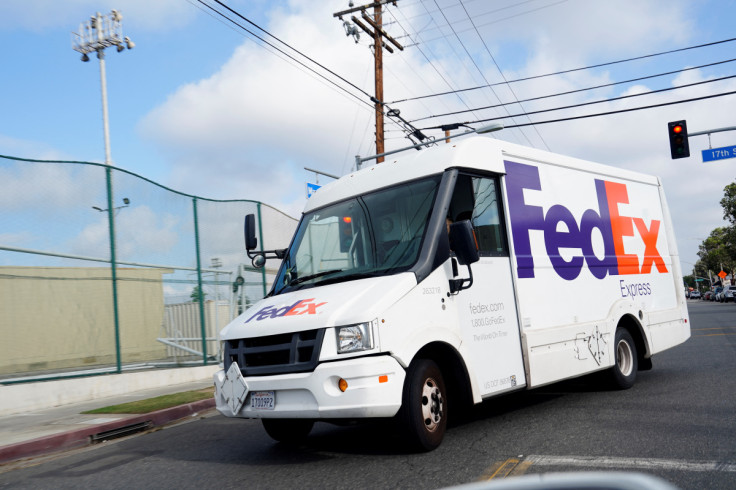Amazon Pact Breathes New Life into FedEx's Faltering Share Price
The logistics giant signs a multi-year deal with Amazon to deliver heavy, rural-bound packages—marking a calculated return that analysts say could help reverse its recent stock dip.

Amid a sluggish stock performance and heightened competition in the logistics sector, FedEx Corporation has reignited its relationship with e-commerce titan Amazon, securing a multi-year deal to deliver oversized parcels to residential customers.
This development comes as rivals scale back, offering FedEx a timely advantage to reclaim momentum in a market segment with lucrative potential.
A Fragile Market Standing
FedEx's (FDX) share price recently edged down to $217.89 (£161.36) on 3 June 2025, extending a trend that has seen the courier giant slump. Over the past month, the stock has slipped by 0.74%, lagging behind both the S&P 500 and the broader Transportation Index.
While some investors interpret this downturn as cyclical, others are increasingly sceptical about FedEx's ability to compete against the expanding in-house delivery networks of Amazon and other major players.
A Well-Timed Reconnection
The agreement with Amazon, finalised earlier this year, sees FedEx assuming responsibility for the delivery of bulky items such as furniture and treadmills—parcels often too unwieldy for conventional logistics streams. This reconnection marks the first formal collaboration between the two since 2019, when FedEx distanced itself from Amazon amid competitive tension.
This time around, the tables have turned. Amazon's recent scale-back of its partnership with UPS—halving delivery volumes due to profit concerns—creates an opening that FedEx appears keen to seize.
FedEx's Chief Customer Officer, Brie Carere, has described the renewed pact as financially sound, pointing out that the deal targets heavy and rural-bound deliveries that dovetail with FedEx's strengths. Carere stated, 'We would not go back to and open a deal after walking away five years ago if it did not make financial sense.' She further highlighted that FedEx excels in managing 'heavy, hard-to-handle packages' and servicing rural areas, which can be particularly valuable when priced appropriately
A Competitive Edge in Rural Markets
Logistically speaking, rural deliveries remain one of the more complex aspects of courier operations. They require greater mileage, incur higher costs, and face inconsistent infrastructure. However, they also present a comparatively underserved market.
FedEx, with its extensive ground network and experience in handling 'hard-to-deliver' parcels, could outperform competitors in this niche. According to freight analytics outlet FreightWaves, the deal is expected to be yield-positive, with above-average margins and heavier load profiles than typical ground shipments.
The deal supports a larger industry trend: logistics firms are moving away from volume-heavy, low-yield deliveries towards specialised, high-margin niches.
Analyst Confidence Grows
Several analysts remain cautiously optimistic. JPMorgan analyst Brian Ossenbeck has raised his price target for FedEx stock from $350 (£259.20) to $366 (£271.05), maintaining a Buy rating and adding the logistics firm to the bank's 'Positive Catalyst Watch.'
In a note to clients, Ossenbeck expressed optimism ahead of the company's earnings report, citing a high likelihood that FedEx will proceed with its proposed spin-off of the Freight segment—an initiative expected to streamline operations and enhance shareholder value.
He also anticipates the firm will reaffirm its full-year earnings guidance, reinforcing confidence in FedEx's strategic outlook.
Bank of America has reiterated a 'Buy' rating on FedEx, trimming its price target slightly from $272 (£201.44) to $270 (£199.96) but underlining the potential uplift in profit margins stemming from the Amazon deal.
A Calculated Gamble with Upside Potential
FedEx's renewed alignment with Amazon is more than a nostalgic re-run; it's a calculated manoeuvre to gain ground in a less-contested, higher-margin market. By leveraging its infrastructure to handle challenging deliveries in rural and suburban corridors, FedEx is positioning itself as an indispensable logistics ally in a post-eCommerce-boom landscape.
While the stock continues to lag, the underlying strategy signals intent, adaptability, and a long-term vision. For investors and analysts alike, this development may not just be a turning point—it could well be FedEx's comeback trail.
© Copyright IBTimes 2025. All rights reserved.





















